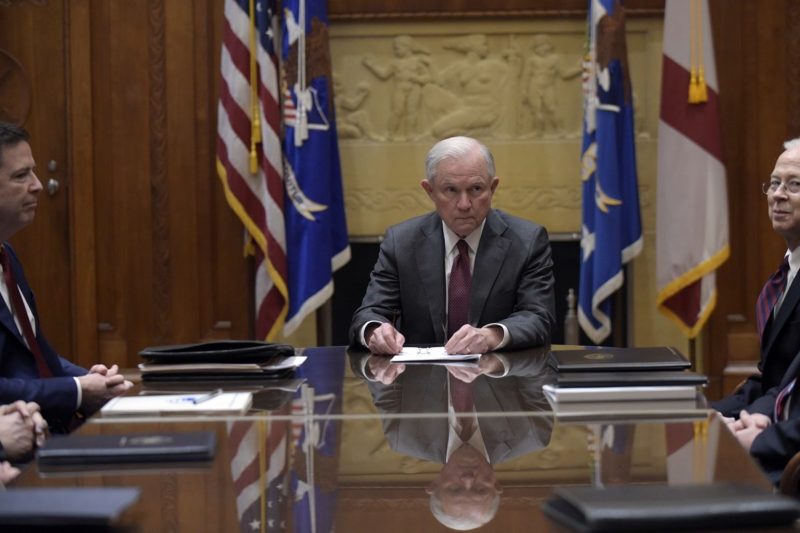Sessions Wastes No Time Attacking LGBTQ Rights
Within his first 48 hours as attorney general, Jeff Sessions made it clear that targeting LGBTQ rights would be a Department of Justice priority.

It didn’t even take U.S. Attorney General Jefferson Beauregard Sessions III two full days before using the power of his position to go after the rights of transgender students, sending a clear message about the future under the Trump administration.
The message came in the form of a court filing in a Texas case challenging an Obama Department of Education (DOE) guidance that public schools and universities receiving federal dollars should protect the rights of transgender students by allowing them access to facilities that align with their gender identity rather than their biological sex. Schools that refuse to comply with the guidance would be considered in violation of Title IX of the Education Amendments Act of 1972, the federal law that prohibits sex discrimination in education, and risk losing their federal funding.
Shortly after the guidance was announced, several states run by conservative lawmakers filed a lawsuit in federal court in Texas arguing the administration had overreached its authority in issuing it. In August, a federal judge blocked its enforcement nationwide, ruling the Obama administration could not punish schools for not accommodating transgender students while the lawsuit proceeds. The Obama administration appealed that initial ruling. That appeal is currently before the U.S. Court of Appeals for the Fifth Circuit.
The new Department of Justice (DOJ) under Sessions changed the course in that case in two significant ways. First, Sessions withdrew a request by the Obama administration to limit the court order blocking enforcement of the guidance to only those public schools in states that sued against the order originally. Sessions and the DOJ then filed a joint request alongside the states challenging the rule, asking the Fifth Circuit to remove oral arguments in the case from its calendar. The request noted that all parties were “currently considering how best to proceed in the appeal.”
In other words, Sessions and the DOJ are trying to find the legal avenues to argue the guidance should not be followed, while the administration works on unwinding it altogether.
The Fifth Circuit has not yet ruled on the request.
The Obama administration took slow, steady steps in recognizing transgender rights under existing federal law. It aligned policy on transgender rights in schools, the workplace, and access to heath care with emerging consensus in the federal courts that existing civil rights laws prohibiting sex discrimination also covered discrimination against transgender people. Contrary to what the states challenging the Department of Education’s guidance argue, this was not the executive branch lurching to the left, nor was it a sudden and radical departure from previous positions. Rather, the DOE guidance was just one of several very measured policy moves on the issue.
These initial court filings by Sessions are no minor thing. There is litigation concerning transgender rights pending in federal courts across the country, including the U.S. Supreme Court. In March, the Roberts Court will hear oral arguments in the case of Gavin Grimm, a Virginia transgender student who sued his school board after a rule change mandated students use restrooms that align with their biological sex.
The Fourth Circuit Court of Appeals ruled in Grimm’s favor, holding the school board’s policy violated Title IX. Before the court ruled, however, the Obama administration submitted an amicus brief on Grimm’s behalf. That brief argued existing civil rights laws like Title IX protected Grimm from exactly the kind of discrimination alleged in his complaint. In ruling in Grimm’s favor, the Fourth Circuit relied heavily on the administration’s statements in that brief, along with the aforementioned DOE guidance.
Friday’s court filings may call into question the foundation of that Fourth Circuit ruling, if the DOJ says the Obama administration’s guidance was wrong.
All this doesn’t just suggest the Trump administration is reversing course on the position that existing civil rights laws protect transgender people from discrimination. It also suggests the DOJ will now actively work against transgender rights by siding with conservative states seeking to do the same.
Attorneys, including those representing the Trump administration, will start submitting briefs outlining their arguments in Grimm’s case with the Roberts Court next week. The brief from the Department of Justice will likely be the first, full articulation of the agency’s position under Sessions’ leadership on what, if any, legal protections transgender people have from discrimination. On Friday, Sessions gave us a little preview of that position: that they have none at all.
